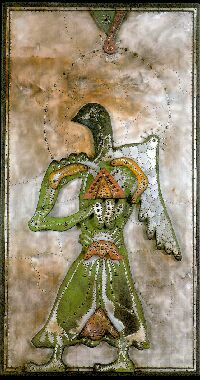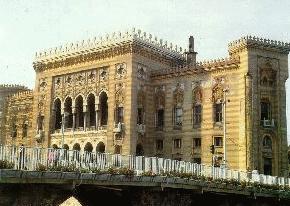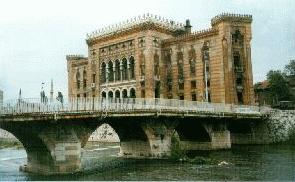The valley of the river was a challenge to man to inhabit even 2400 years B.C. The civilisation grew through milleniums, plundered and invaded by many but also enriched by them. Traces of history can be seen as wounds but also as flowers.
An interview about the heart of the town. The Obala River Bank. Obala kulina Bana on the west ride and Obala Maka Dizdara on the east side. Coming out of the mountains from the direction Pale the city really starts at Bascarsjia, the old town and the old and destroyed National Library, right in front of it, down at the river side. Due to reconstruction the library is now seated at Maka Dizdara 2 right across the Dutch Embassy, The British council, CiMiC, Publishing House Veselin Maslesa, etc.
After our introduction Gospodin Kujundzic starts;
‘The first time bread was produced was in the upper
area of Mesopotamia, the upper regions of the Euphraat river, where the first bread was produced,
by the archaeological evidence, so th production of bread was related to
the river. So you wanted to go from the old library to Walter Spomenik.
You could go to the next bridge. There is a monument on the bridge of Suada
Dilberovic.’ (The first Sarajevo victim of the war. red.)
the upper regions of the Euphraat river, where the first bread was produced,
by the archaeological evidence, so th production of bread was related to
the river. So you wanted to go from the old library to Walter Spomenik.
You could go to the next bridge. There is a monument on the bridge of Suada
Dilberovic.’ (The first Sarajevo victim of the war. red.)
To us that seems a good idea.
Our first question is made by a cameraman who went into the old library and made these beautiful shots. At the beginning the people who went in talked a little but it becomes quite. This places, which was a centre in the culture, was the target. Through this silence they realised that very strong. What happened to the books? That would be my first question. To start up from when the library is actually close to nothing because there is much more important things to take care of - food, shelter
“Actually I’m speaking under the pretext of what
you say you are doing, which is kind of interesting - The city, and related
to the banks of the of the Miljacka river. Our library was also located
there. The building is still there on the right bank. This building was
completed in 1896 and it was mend to be the city hall, which it was for
many years. But in 1951 it became the seat of the national and universal
library of Bosnia Hercegovina. It was destroyed in August 1992. Many book
and many other library items vanished in the destruction. We have hoped
actually that by reconstitute these collections that we will find more
materials saved than it was., but now we are actually facing the situation
in which we have to recognise that many documents have been lost forever.
But, off course, every library is in a position to stay alive, because
if destroy a book in one place and there is a copy in the other place.
That is , off course, if it is not a unique place. If it is a unique place
than it is lost forever. So by reconstituting the collections of the library
we are hoping , that with good will and co-operation with other libraries,
we will get back some of the lost documentation of the heritage of
BiH. Currently we are working on two levels; One is providing a building
for the new books and the old books, which have been saved and two is to
realise the institution as a living institution which means providing the
students with necessary books, information of their studies, The library
has a function
We have as I would say, 25 different functions.
This is not visible at first sight but if you talk to the people that work
in the library than you would recognise many sides and abilities of an
institution like this. Because it is the National and Universal library
of BiH which means we have responsibility to take part in the international
library exchanges, to take part in the intern library associations and
to the other libraries in BiH. because you should know that many libraries
and it’s contents have been destroyed in BiH like in Maglaj, Mostar and
other places, so now what our library is doing is to asset the damages
done and try to help these people to get back to what they used to do.
And, off course, we ourselves are facing difficulties
because there not enough budget for all our activities, because our staff
has shrinked for 50% so before we had 108 people working and now we have
65.

And in the same time the job has doubled, maybe even more than doubled.
Yes, even more, yes because you have to keep the work going and in the same time you have to rebuild the library. And modern technology is actually hard to get because it is expansive, you need a lot of expertise, and so on, but I am a little optimistic facing the future because now we have 150.000 books already which are accessible through the catalogue and are available to students who are interested, researchers, professors and general public.’
And how many books have been available to the public before?
‘ Before this destruction this library had more than 2 million library items and of these 1 million books were actually present at the library, so we will probably never be able to be a library of the same size, but we are a library of the same purpose, and this is to be emphasised.
Maybe it is in your interest too that we are also trying to build our musical selection which means that we’ll be able to provide the readers and users with music produced in BiH. We will also try to keep a record of the music production because as a national library we have to have part in that archive of music. ‘
That is interesting. I know that many western libraries are changing, become computerised, use these new technologies. I can imagine that a library which is confronted with such a big problems as the National Library is, it is more a dream than a necessarity?
‘It is interesting that it had a spill-over effect to us because some of these people have send their books to us.’
Because they used these new technologies?
‘So we had to defend ourselves from these cases.’
Let others use the technologies which allows you to get move..
‘Information. New technologies are indeed the most economical way to build the collections. This is one thing the new technologies could bring, on one table you have 500 journals and running from 5 years before, so it is very economical if you have no space, not enough staff and if you don’t have money enough. I think that new technology is good but also you have to have in mind perspective to our national production and latest editions to keep it for the later generations.’
Can you tell a little more over those who support you?
‘ You can look at this problem from two points- one point is the building and the other is it’s contents. We have recently got a temporary building for our purposes at the Tito barracks area. It is a building about 24000 m2 size. And recently we have been successful to repair one floor and now we are looking forward to finish the first and second floor so the whole building could be available for the library. But this is very difficult as you know, the international help which is needed for our country is usually directed to the immediate needs. Priorities are somewhere else. high education, as young people and professors know is not in this sensible area. And this is only a part of it. Even if you have refurbished a building, you need furniture, modern technologies, training, you need subscriptions to the journals and so on. So, as you see, I haven’t even touched the difficulties that we have to face after we rebuild the building, it will take some time. But still I have more optimism is based on the fact that even if you don’t have space in the city of Sarajevo, we have been given a small building to operate in as a library, And this is a good sign. Another good sign is that the building was part of a military barracks when BiH was part of Yugoslavia, and now it is going to be a library, which is in a way a good sign.;’
I assume the government also gives you tasks?
‘Off course! The national Library is an important cultural institution in any country, it is also important in our country and we try to find space for this institution. It is quite difficult and it will take time and efforts.’
I see that the old library is being reconstructed. Partly paid by the Austria Government and partly by the European Union.
‘The reconstruction has started and they finished the roof. The big tasks are ahead and the EU is supporting further work, but this is not enough for the whole building and it will take some time before it is completely reconstructed
‘It is a huge and complex operation and it requires a lot of money and expertise, many technicians and a lot of time.”
Do you think the Nat. and Uni. lib. will be in that building too?
‘Well I do think that at least some of our functions may be located there. But it not only depends on us, it depends on many different organisations, institutions and people and what they want with the building. For us it is important to provide the services immediately. Because we don’t know when the building will be available, we are taking the fasted steps for us to be useful to the readers, and that is important.’
I think that this phrase is so to say; hitting the nail on it’s head. It is probably going to be back in more interviews we do, even if we go to complete different organisations and institutions. We can think about beautiness of the possibilities but often the necessarity is much more a priority.
 ‘
Yes and you’re talking on the name of a peace organisation than I can say
that we will try to build up, within our collections, so that people can
study various problems in war, and also peace building process and in understanding
the relations between nations, countries, how the intern community works,
so it may help us to build on these bases, a different approach to the
future of this country.’
‘
Yes and you’re talking on the name of a peace organisation than I can say
that we will try to build up, within our collections, so that people can
study various problems in war, and also peace building process and in understanding
the relations between nations, countries, how the intern community works,
so it may help us to build on these bases, a different approach to the
future of this country.’That might also be a long term idea, cause I do have the feeling that war in YU also needs some time before the right books are written about it.
‘ Yes, well, YU existed since 1918, in various forms and Bosnia existed many centuries before. So the settlement of these various issues will take time and things will be clearer in the future. I only hope that the citizens of this country could devellop some kind of solidarity in the case of great difficulties they are facing now. Because everybody has problems in terms of everyday life’s reality- the reconstruction of the country, the wounds within the people, many have lost their loved ones during the war. There are also economical problems, psychological, social. So I think when all these issues become clearer, than the people can approach their problems much easier. If they are only in the fog, than the problems become great because you don’t know where to go. And sometimes the international community is not even clear about what it wants in BiH.
Actually I could add that sometimes they put a hat on their head which is smaller than the head is, so they don’t feel comfortable about it. But at least there’s a institution- the colleagues in our library- that usually know what they want. And I hope that we will achieve it!
Attn. to Gospodin Dr Enes Kujundzic, Director
Address Maka Dizdara 2, 71000 Srarajevo, BiH
Tel i fax ++ 387 71 533204